Clinical diagnostic laboratory
The clinical diagnostic laboratory department is located at the territory of the of TMA in building – 12 on the first floor.
The clinical diagnostic laboratory was founded in 1976 on the bases of Tashkent State Medical Institute. The heads of the laboratory were: M.M.Makhmudova (1991-1996), then from 1996 till 2001 – N.S.Adilkhodjayeva headed the laboratory; from 2001 to present dayM.A.Nuritdinova has been heading laboratory. At present day 18 doctors work at this department, from them 10 doctors with higher category, one doctor scientific degree of candidate medical sciences .There are 22 medical laboratory assistants, of them 9 - medical laboratory assistants have higher category.
The clinical diagnostic laboratory is medical specialty, subject of the specialists’ activity which is clinical laboratory investigations, that is to study the composition of the patients biomaterial sample with the aim of detection of measurement their endogenous or exogenous components, structural or functional affected condition and activity of organs, tissues, body system, lesion which may be in suspected pathology
Clinical laboratory diagnostics (laboratory diagnostics) represents medical diagnostic specialty, consisting of the whole investigations in vitro of biomaterial of human organism, based on the using of hematological, general-clinical, parasitic, biochemical, immunological, serological methods, comparison of these methods results with clinical data and formulation of laboratory conclusion. The progress in the field of fundamental investigations and application of their results into practice predetermine deepening the scope of content and expansion of the clinical laboratory diagnostics in future. The basis of clinical laboratory diagnostics compose medical technology which each of them must be passed by scientific approbation and procedure of license to applying requires specific methodical recommendations ,working place ,sanitary rules, technical control, personnel training, economical justification and others.
The main aim of clinical diagnostic laboratory (CDL) is a guarantee the quality of laboratory investigations by constant improvement of the clinical diagnostic laboratory activities, providing with necessary laboratory information of doctors of the clinical units
The tasks of DCL:
- Conducting the clinical laboratory investigations in accordance with profile of medical institutions (general- clinical, hematological, immunological, cytological, biochemical land other having high analytic and diagnostic reliability), according to reported nomenclature of investigation in accreditation of CDL in accordance with the license of medical institution. The volume of performed investigations must not be lower than minimal volume, recommended for medical institution of this facility.
- Introduction of progressive forms of the work, the new methods of investigation, which has high analytic accuracy and diagnostic reliability..
III. Increasing the quality laboratory investigations by systematic conducting of intralaboratory control of quality of the laboratorial examinations and participating in the program of external estimation of quality.
- Rendering the consultative aids to doctors of therapeutic departments in choice the most diagnostically informative laboratory tests and sampling of laboratory examinations of the patients.
- Provision with clinical personnel ,who collects the biological materials ,detailed instructions about the rules of taking, storing and transportation of biomaterial ,providing the stability of samples and reliability of the results. The heads of the clinical units are responsible for the exact observance of these rules of clinical personnel.
- Increasing the qualification of personnel of the laboratory.
VII. Conducting the measures on labor protection of personnel, observance of accident prevention, industrial sanitary, and antiepedemic regime in clinical- diagnostic laboratory.
VIII. Introduction of registration and accountable documentations in accordance with confirmed forms.
The associates of the department of clinical diagnostic laboratory
Department of clinical diagnostic laboratory of the clinic TMA includes clinical, biochemical, immunological and emergency laboratory. Laboratory was equipped with up-to-date technologies and.
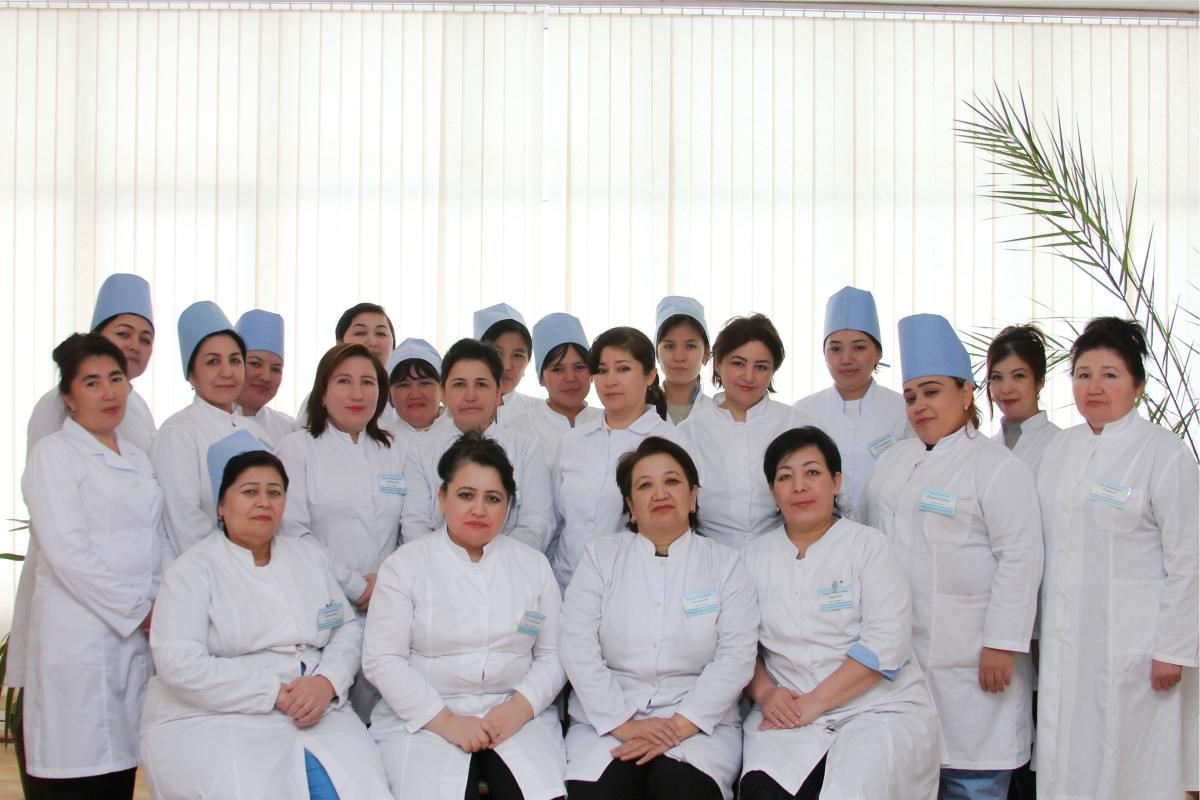
Biochemical laboratory
In biochemical laboratory a great number of biochemical indexes, which reflecting the functional condition of separate organs and system of human organism are used. Biochemical laboratory was enriched with new methods of kinetic measuring of not only the activity of ferments but and concentration of substances. Wide implementation of biochemical analyzers allows carrying out the complex analysis with using of lesser volume of biological samples. In biochemical laboratory assistants prepare solutions, build calibrating curves, cleanse chemical laboratory glass wares, prepare biomaterials for investigation and reagents for determination of heparin tolerance ,carry out the biochemical examinations working in apparatus, making the necessary calculations, detecting the disturbances of protein, carbohydrates,lipids,ferments,hormones, water – in - mineral , acid-base condition ,system of hemostasis and others.
The modern level of biochemical examinations requires implementation of calibrators for determination of ferment activity, elaboration of standards and receiving the domestic standard samples for investigation of analysis of blood ,urine and other bioliquids.
Coagulology — specific type of laboratory examination , receiving the wide implementation of invasive,surgical,intravascular interventions with using of wide spectrum of recent generation of drug preparations influencing on vascular platelet ,plasma hemostasis,fibronolysis,activity of anticoagulants. Long – term direction of biochemical examinations is analysis of specific proteins, hormones, biological active metabolites, vitamins, isoenzymes and isoforms and others. Wide implementation into laboratory practices the methods of electrophoresis and chromatography, the methods of complex biochemical and immunological analysis – immunoelectrophoresis, enzymoimmunoassay, nephelometry and etc.
Immunological laboratory
Immunological laboratory has proper subject of investigation, connected with estimation of immune status including of determination the parameters of cellular and humoral immunity ,diagnostics and characteristics of autoimmune diseases, immune component of the wide spread pathology. Pathogenesis of such diseases as diabetes of the type II ,diffuse toxic goiter, rheumatism are associated most of all with immune disorders. It is impossible to diagnose without immunological investigations HIV infection, the type of hepatitis, system collagenoses,a number of malignant diseases and etc. Infectious immunology becomes separate modern direction of laboratory diagnostics, which allows not only to identify the viral, bacterial, parasitic infections, but and to define the captioning data of antibody, to assess the immunity to separate types of infectious diseases, on the base of determination viral loading to prognoses of transferring the infection into clinical form of disease, in particular the development of the AIDS.
Clinical laboratory
Clinical laboratory – is a significant branch in laboratory diagnostics. Clinical methods of diagnostics are the most popular traditionally type of investigation, which is based on microscopy. Microscopic techniques requires individual skills on the one hand, subjective factor is significant on the other hand. In recent years liquid hematological analyzes, which performing partial or practically complete analysis of blood cells and determining the index of red blood including hemoglobin, hemotokrit and erythrocyte indexes. For the calculation and analysis of blood cells hematological analyzer with different level of complexity are used. Advantage of modern technology of accounting and blood corpuscle estimation is : high productiveness (until 60 samples in an hour), small volume of blood for analysis (12-150 mcl, analysis of great massive (ten thousands) cells, determination with higher accuracy and reproducibility of 26 and more parameters blood analysis at the same time, pictorial representation of study results (histograms, sketgramms). On comparison with visual techniques, automatically calculation - more precise method of estimation cell concentration .For urine investigation mono - and polyfunctional test are used simultaneously with microscopic method - line ‘‘dry chemistry ‘’with the subsequent semi quantitative determination of parameters of urine on reflection photometers.
Express laboratory
The express laboratory uses a large number of biochemical and clinical indicators that reflect the functional state of individual organs and systems of the human body. The biochemical laboratory has been enriched with new methods of kinetic measurements of not only the activity of enzymes, but also the concentration of substrates. The widespread introduction of biochemical analyzers makes it possible to carry out a comprehensive analysis using an ever-smaller volume of a biological sample. In biochemical laboratories, prepare solutions, build calibration curves, handle chemical dishes, prepare biomaterials for research, prepare reagents for determining heparin tolerance, conduct biochemical studies working on devices, make the necessary calculations, identify disorders in the metabolism of proteins, carbohydrates, lipids, enzymes, hormones , water-mineral, acid-base state, hemostasis system, etc.
The modern level of biochemical research requires the introduction of calibrators to determine the activity of enzymes, the development of standards and the production of domestic standard samples for the study of blood, urine, and other biofluids.
Coagulology is a specific type of laboratory research in a biochemical laboratory, which is becoming more widespread due to the widespread introduction of invasive, surgical, intravascular interventions, the use of a wide range of the latest generations of drugs that affect vascular platelet, plasma hemostasis, fibrinolysis, and anticoaculant activity. A promising area of biochemical research is the analysis of specific proteins, hormones, biologically active metabolites, vitamins, isoenzymes and isoforms, etc.
Biochemical types of analyses conducted at laboratory diagnostic department of TMA
|
Biochemical types of analyses : |
|
|
1 |
Definition of ALT |
|
2 |
Definition of АSТ |
|
3 |
Definition of cholesterol of higher density. |
|
4 |
Definition of cholesterol of lower density. |
|
5 |
Definition of potassium in blood serum |
|
6 |
Definition of natrium blood serum |
|
7 |
Definition of crude protein |
|
8 |
Definition of urea |
|
9 |
Definition of kreatine |
|
10 |
Reberg sample |
|
11 |
Definition of calcium |
|
12 |
Definition of iron |
|
13 |
Definition of glucose in blood |
|
14 |
Definition of crude bilirubin |
|
15 |
Coagulogram (9 investigations) |
|
16 |
Definition of diastases |
|
17 |
Uric acid |
|
18 |
Definition triglycerides |
|
19 |
Thymol test |
|
20 |
Definition of magnesium |
|
21 |
Definition of phosphorus |
|
22 |
Definition of alkaline phosphatase |
|
23 |
Definition of protein fraction |
|
24 |
Definition of LDH |
|
25 |
Definition of albumin |
|
26 |
Definition of glycohemoglabin HbA |
|
27 |
Total cholesterol |
|
28 |
Immunoglobulin G |
|
29 |
Immunoglobulin A |
|
30 |
Immunoglobulin M |
|
31 |
Micro albumin in urine |
|
32 |
Definition of kteatine in urine |
|
33 |
Bilirubin direct |
|
34 |
Coagulogram (5 investigations) |
|
35 |
Kreatinephosphokinase КPК |
Immunological types of analyses conducted at diagnostic laboratory of TMA
|
1 |
Rheumatic test АSLО |
|
2 |
«S» reactive protein |
|
3 |
Definition of rheumatic factor |
|
4 |
Wassermann reaction «RW» |
|
5 |
Definition of HbsAg |
|
6 |
Definition Herpes simplex |
|
7 |
Cytomegalovirus «CMV» |
|
8 |
Definition of toxoplasmosis |
|
9 |
Definition of Chlamydia |
|
10 |
Hepatitis HVC Ag |
|
11 |
Definition of ureoplasma |
|
12 |
Definition of mycoplasm |
|
13 |
Definition of troponin |
|
14 |
Definition of cartisol |
|
15 |
Definition of progesterone |
|
16 |
Helicobacter Pillory |
|
17 |
Definition of blood group |
|
18 |
Definition of TTG and T3 |
|
19 |
Definition of ATTPO |
Clinical types of analyses
|
1 |
General blood analysis |
|
2 |
General urine analysis |
|
3 |
Nicheporenko |
|
4 |
Zimnitsky |
|
5 |
Sputum |
|
6 |
Determination of ВК |
|
7 |
General analysis of scatology |
|
8 |
Stool analysis for worm ovum |
|
9 |
Synovial liquid |
|
10 |
Pleural liquid |
|
11 |
Stool analysis for latent bleeding |
|
12 |
Determination of LE cells |
|
13 |
Determination bilious pigment |
|
14 |
Determination sugar in urine |
|
15 |
The time of blood coagulability |
|
16 |
Determination of leucocytes activity in urine |
|
17 |
Determination of plasmode malaria |
|
18 |
Determination of hemoglobin |
|
19 |
Daily urine to protein |
|
20 |
Determination of Bens-John protein in urine |
Emergency analyzes carried out in the express laboratory at TMA
|
Biochemical types of analyses : |
|
|
1 |
Definition of ALT |
|
2 |
Definition of АSТ |
|
3 |
Definition of cholesterol of higher density. |
|
4 |
Definition of cholesterol of lower density. |
|
5 |
Definition of potassium in blood serum |
|
6 |
Definition of natrium blood serum |
|
7 |
Definition of crude protein |
|
8 |
Definition of urea |
|
9 |
Definition of kreatine |
|
10 |
Reberg sample |
|
11 |
Definition of calcium |
|
12 |
Definition of iron |
|
13 |
Definition of glucose in blood |
|
14 |
Definition of crude bilirubin |
|
15 |
Coagulogram (9 investigations) |
|
16 |
Definition of diastases |
|
17 |
Uric acid |
|
18 |
Definition triglycerides |
|
19 |
Thymol test |
|
20 |
Definition of magnesium |
|
21 |
Definition of phosphorus |
|
22 |
Definition of alkaline phosphatase |
|
23 |
Definition of protein fraction |
|
24 |
Definition of albumin |
|
25 |
Definition of glycohemoglabin HbA |
|
26 |
Total cholesterol |
|
27 |
Micro albumin in urine |
|
28 |
Definition of kteatine in urine |
|
29 |
Bilirubin direct |
|
30 |
Coagulogram (5 investigations) |
|
31 |
Blood group |
|
32 |
General blood analysis |
|
33 |
General urine analysis |
|
34 |
Nicheporenko |
|
35 |
Zimnitsky |
|
36 |
Sputum |
|
37 |
Determination of ВК |
|
38 |
General analysis of scatology |
|
39 |
Stool analysis for worm ovum |
|
40 |
Synovial liquid |
|
41 |
Pleural liquid |
|
42 |
Stool analysis for latent bleeding |
|
43 |
Determination of LE cells |
|
44 |
Determination bilious pigment |
|
45 |
Determination sugar in urine |
|
46 |
The time of blood coagulability |
|
47 |
Determination of leucocytes activity in urine |
|
48 |
Determination of plasmode malaria |
|
49 |
Determination of hemoglobin |
|
50 |
Daily urine to protein |
|
51 |
Determination of Bens-John protein in urine |
SPECIALISTS
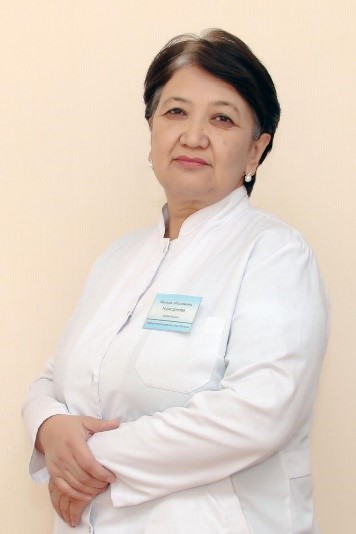
Нуритдинова Масуда Абдусаломовна
заведующая клинико-диагностической лабораторией, врач-лаборант высшей категории.
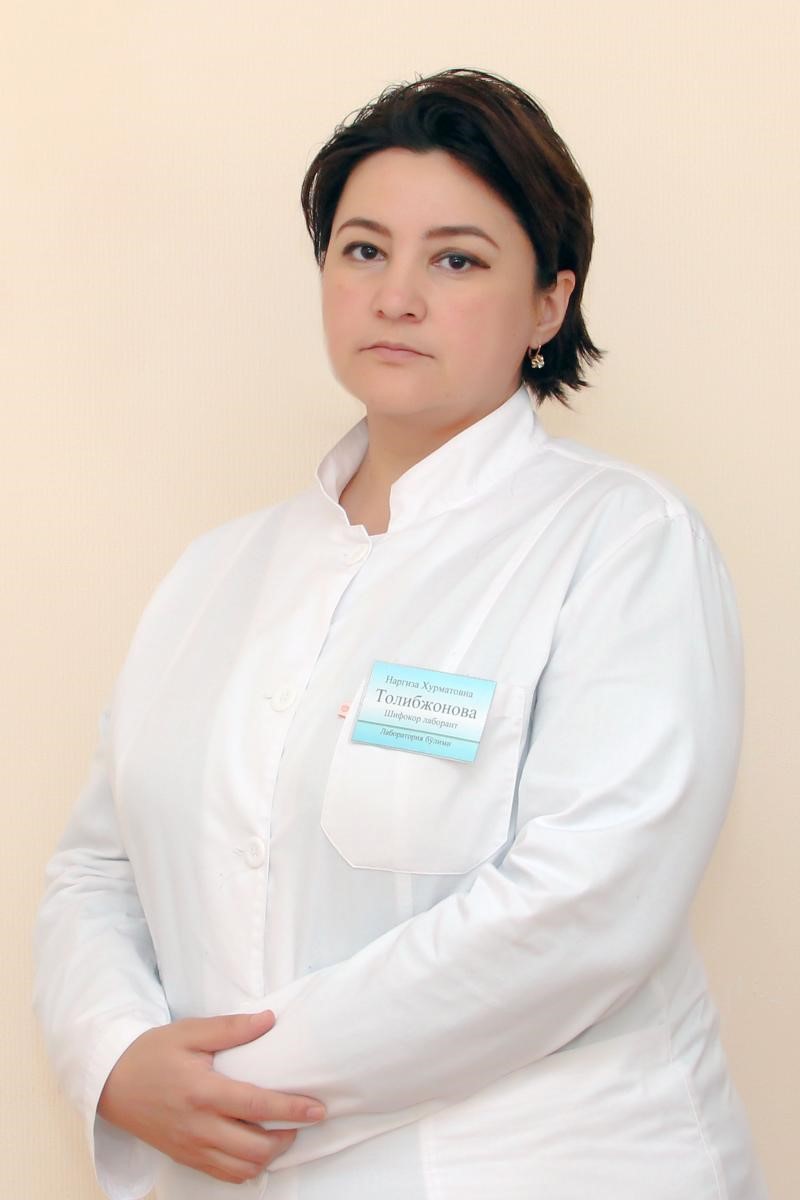
Толибжанова Наргиза Хурматовна
- врач-лаборант высшей категории.
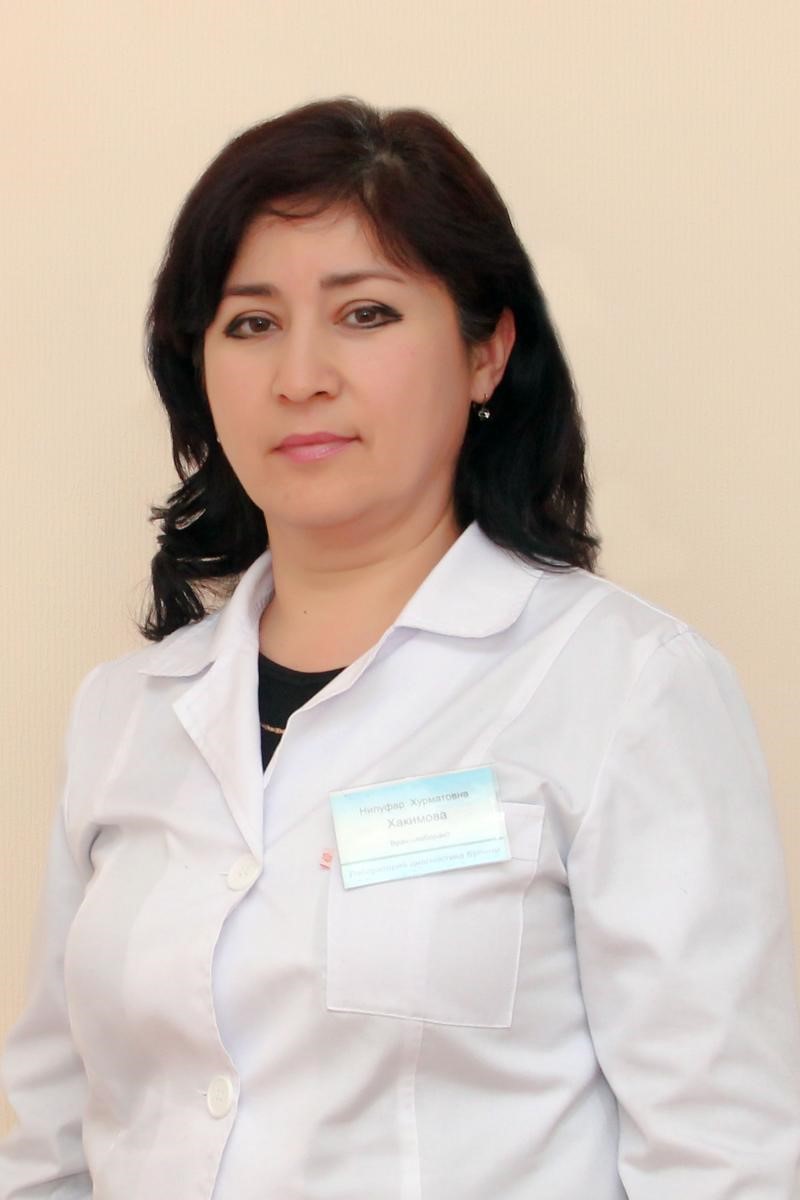
Хакимова Нилуфар Хурматовна
- врач-лаборант высшей категории.
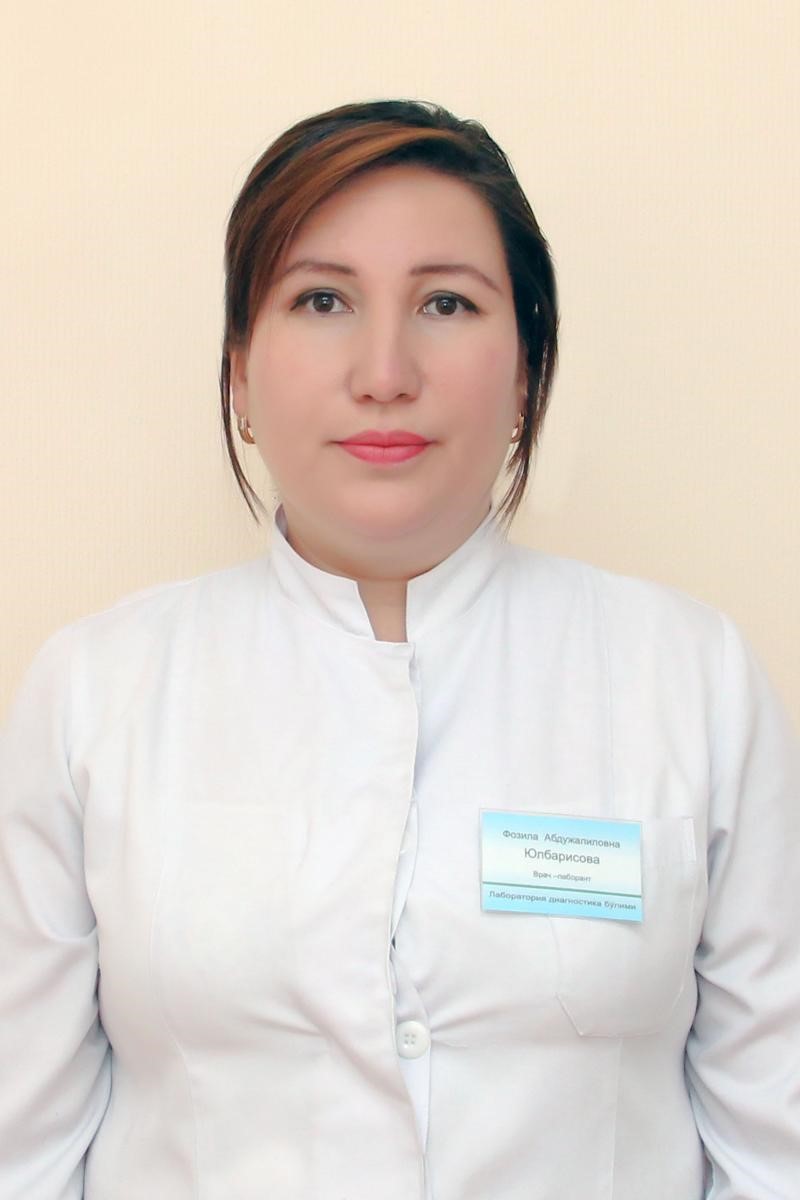
Юлбарисова Фозила Абдужалиловна
- врач-лаборант высшей категории, кандидат медицинских наук.
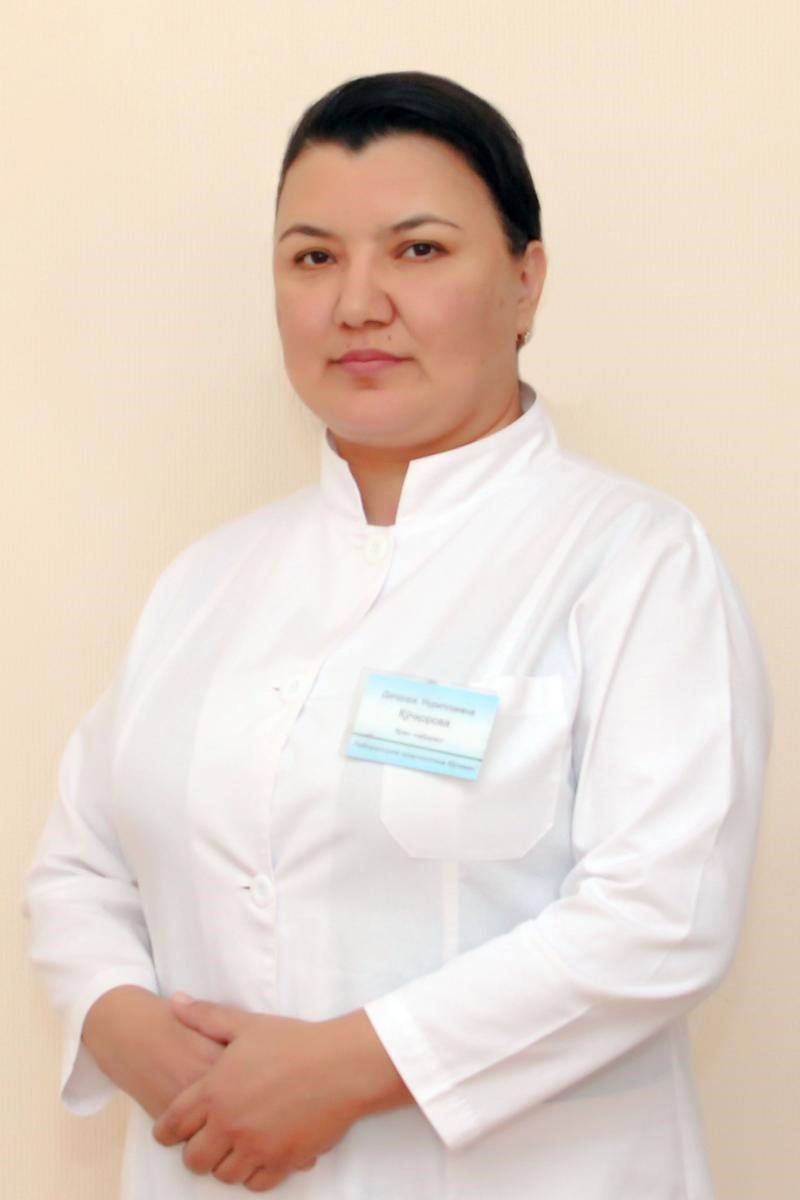
Кучкарова ДилдораНуриллаевна
- врач-лаборант высшей категории.
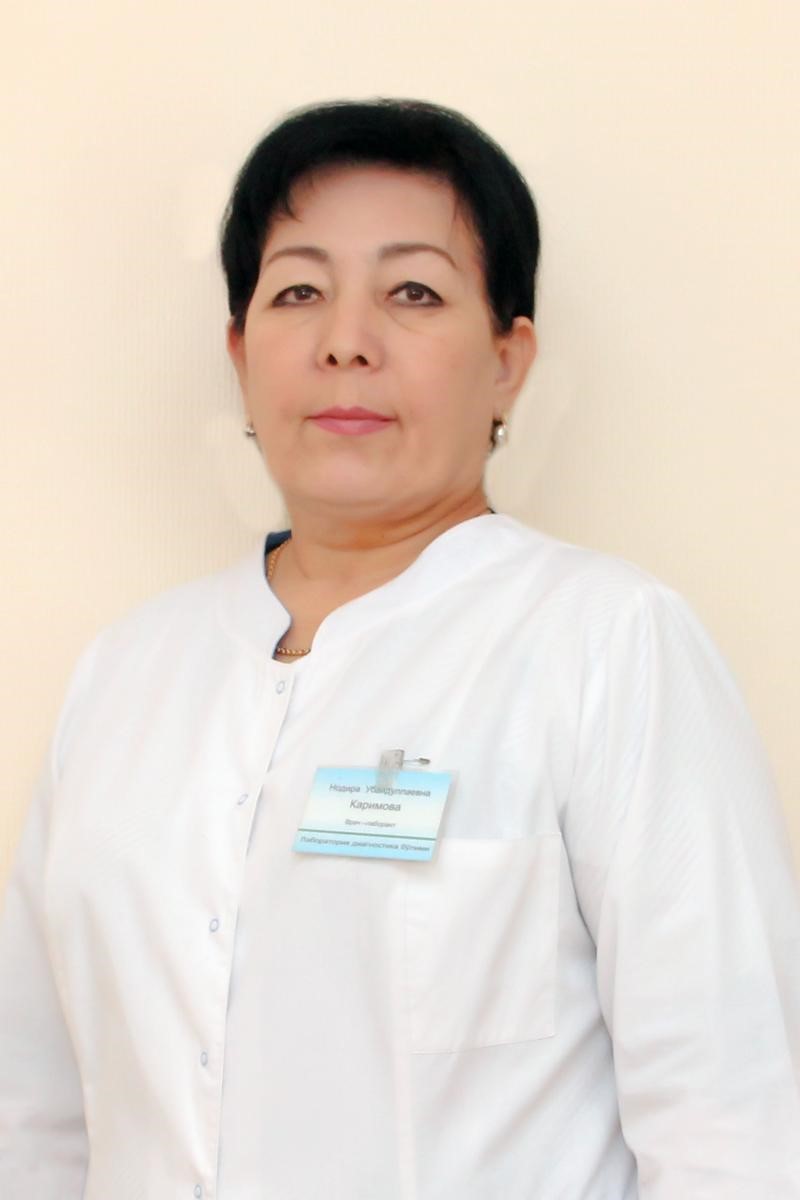
Каримова Нодира Убайдуллаевана
- врач-лаборант высшей категории.
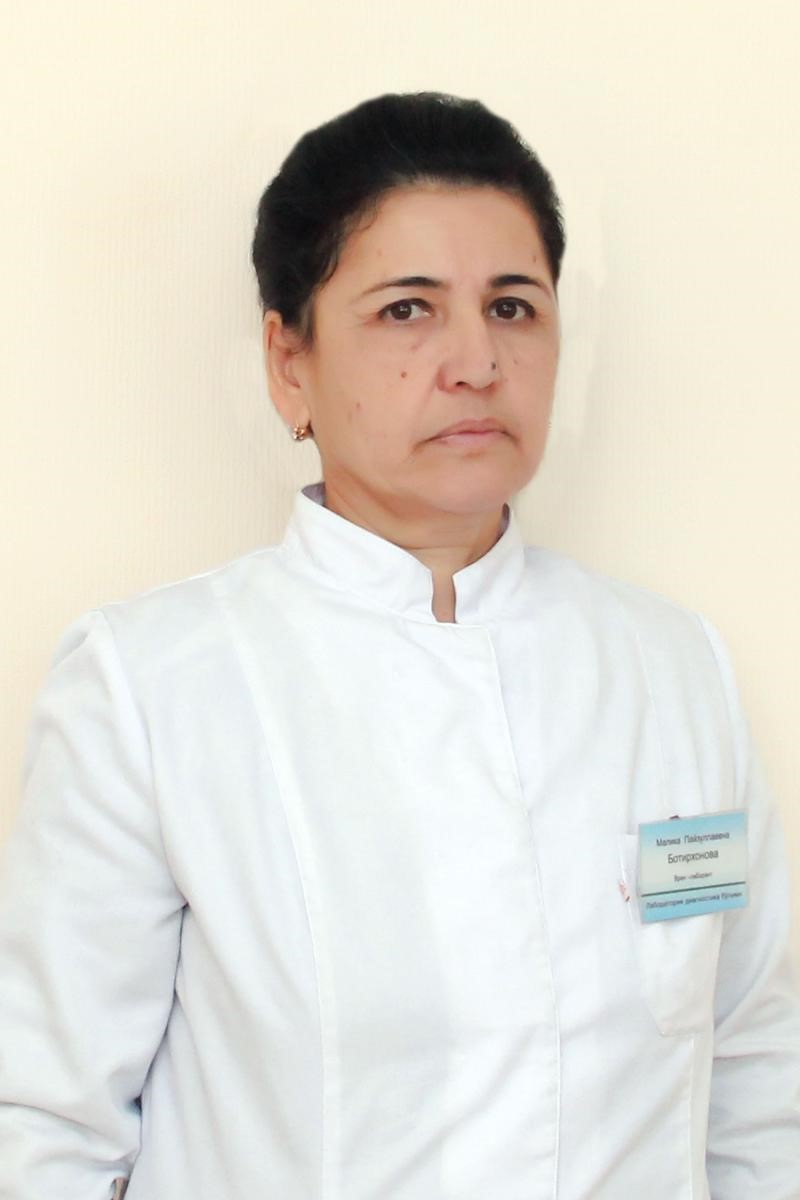
Ботирхонова МаликаПайзуллаевна
- врач-лаборант высшей категории.
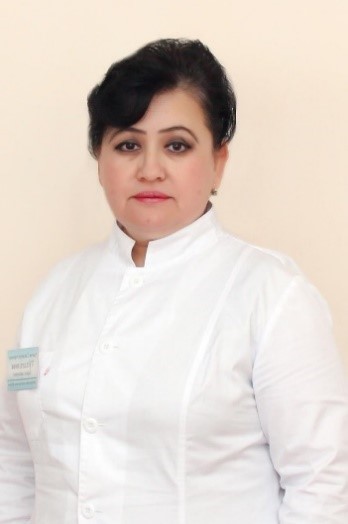
Тулаганова Азиза Саидмухтаровна
- врач-лаборант высшей категории.
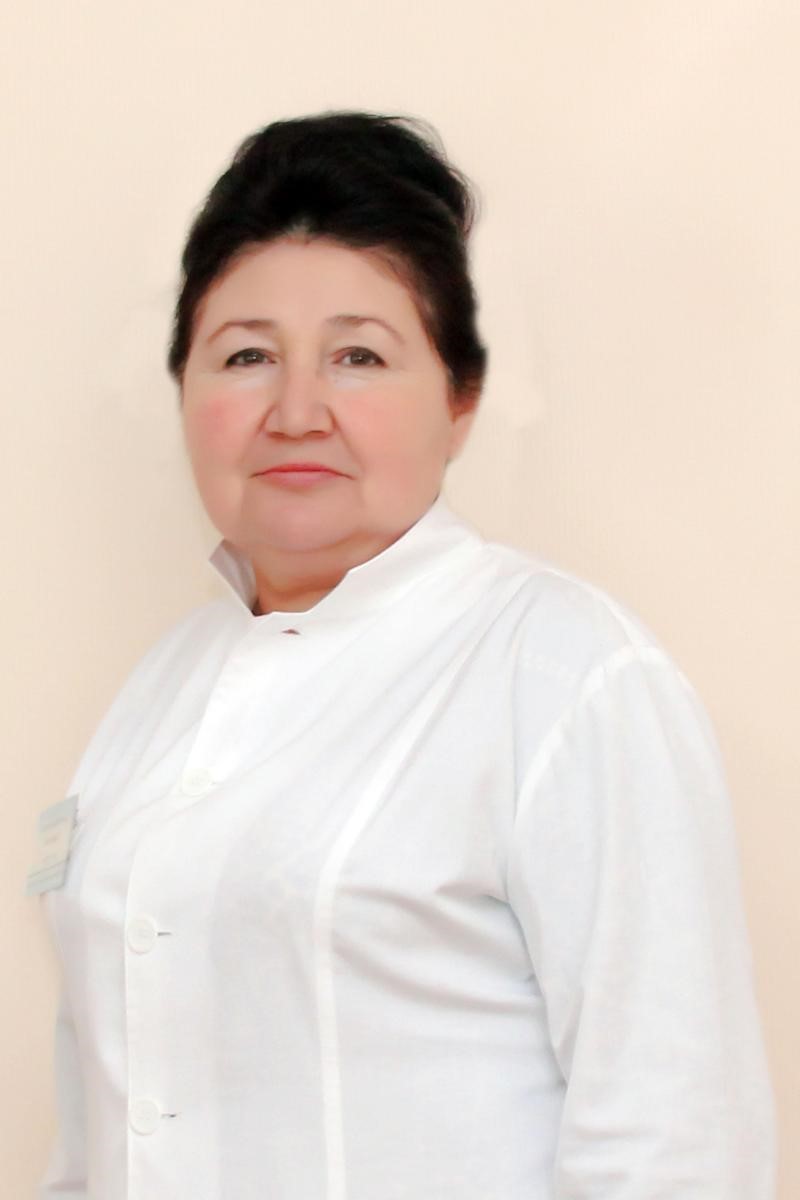
Жамилова Доно Абдукаххоровна
- врач-лаборант первой категории.
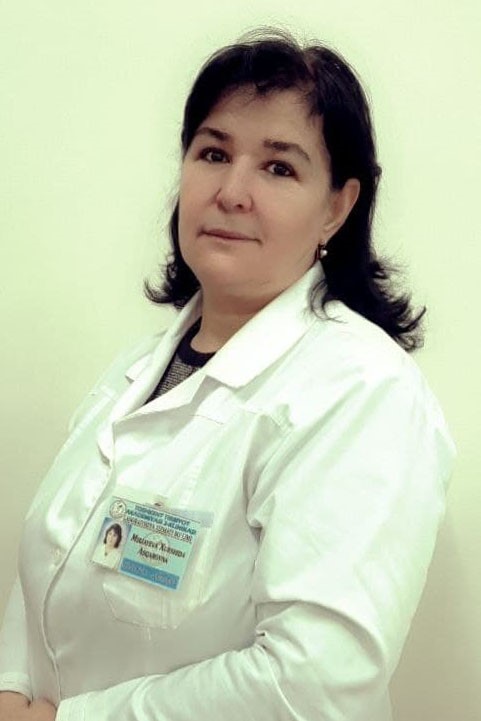
Мирзаева Хуршида Аскаровна
- врач-лаборант высшей категории.
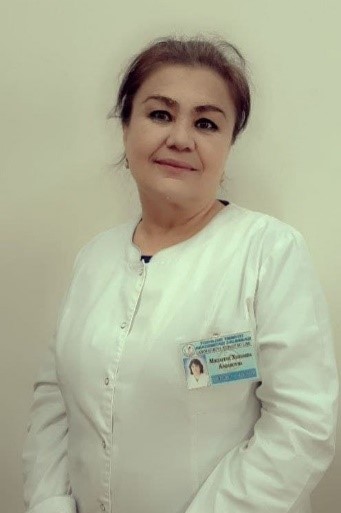
Каримова Дилбар Махмудовна
- врач-лаборант высшей категории.
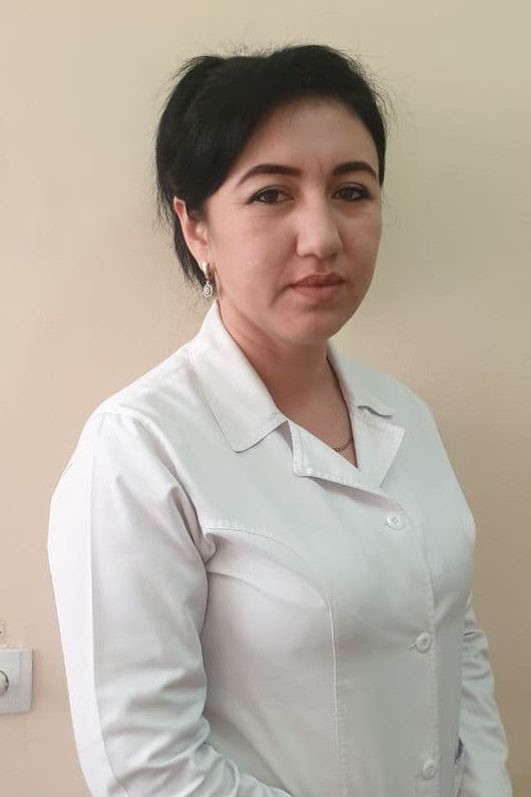
Рахматуллаева Мархабо Асатуллаевна
- врач-лаборант высшей категории.
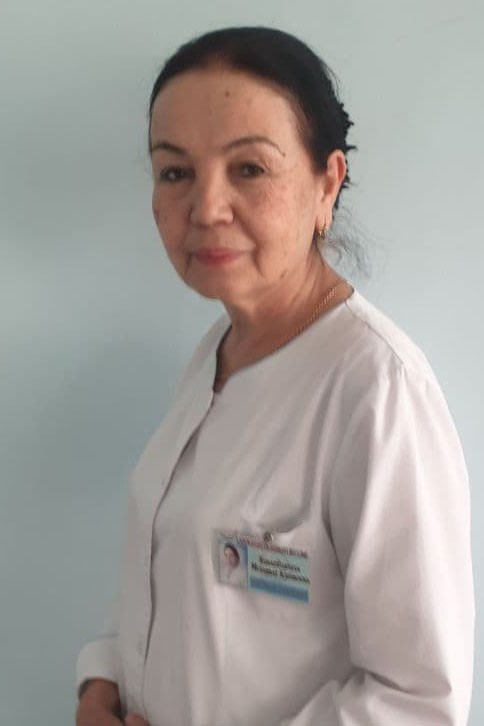
Самадхожиева Мухаббат Илхомовна
- врач-лаборант высшей категории.
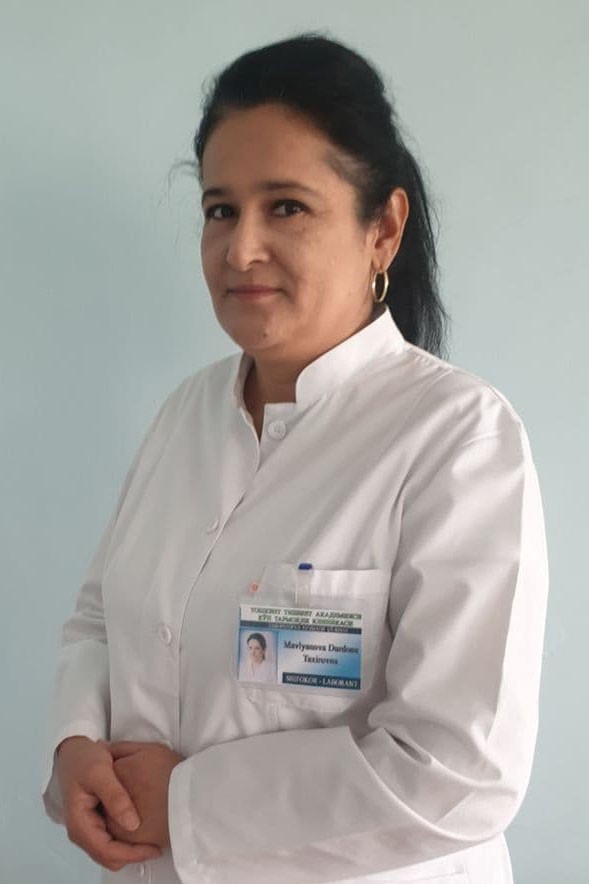
Мовлонова Дурдона Тохировна
- врач-лаборант высшей категории.
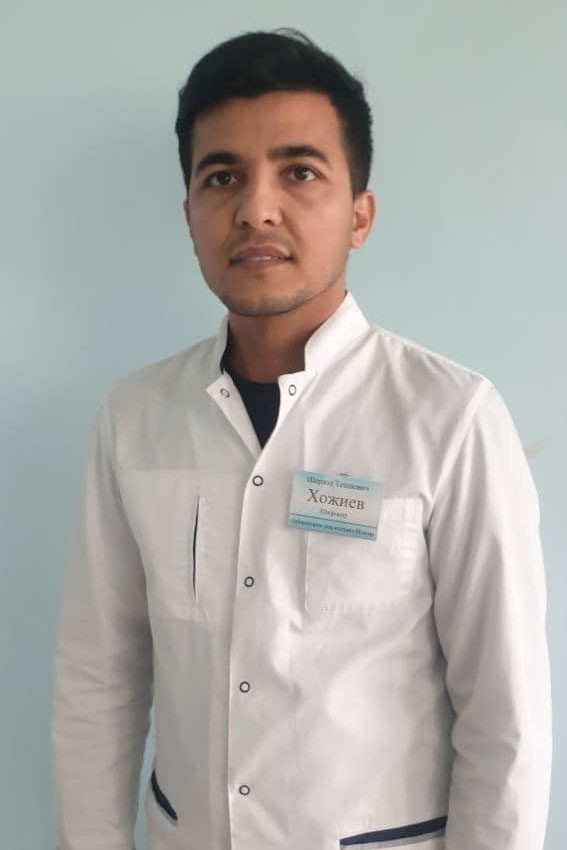
Хожиев Шерзод Тешаевич
- врач-лаборант
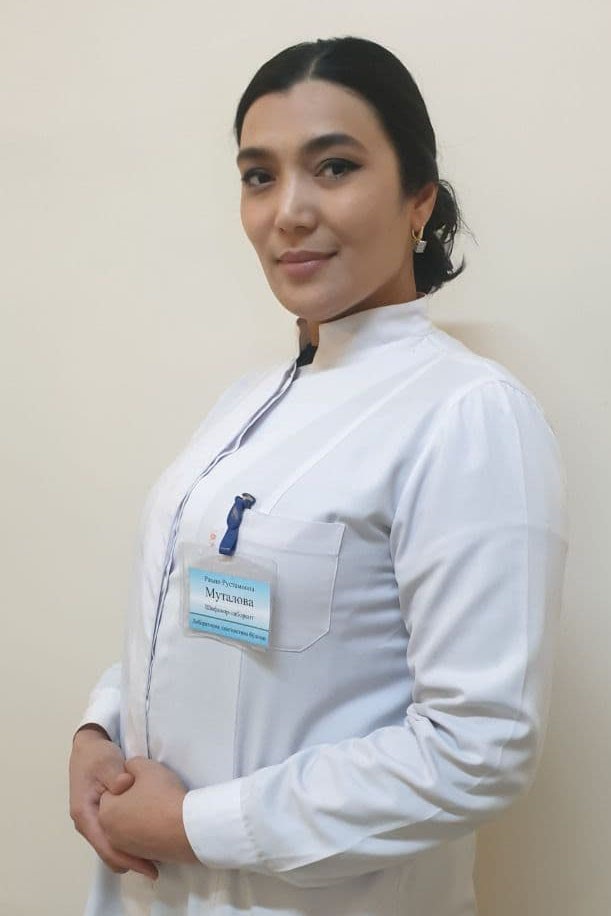
Муталова Раъно Рустамовна
- врач-лаборант
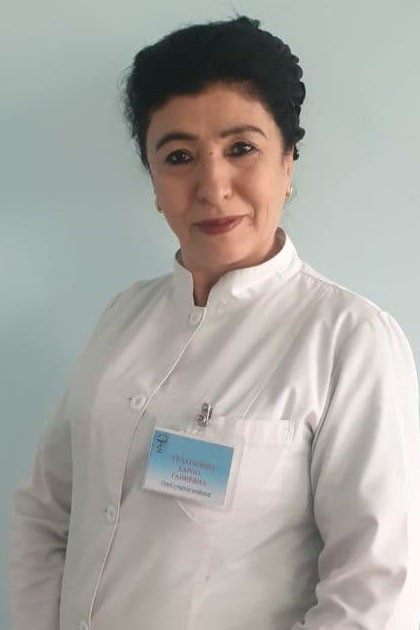
Тулаганова Барно Ганиевна
- врач-лаборант высшей категории.
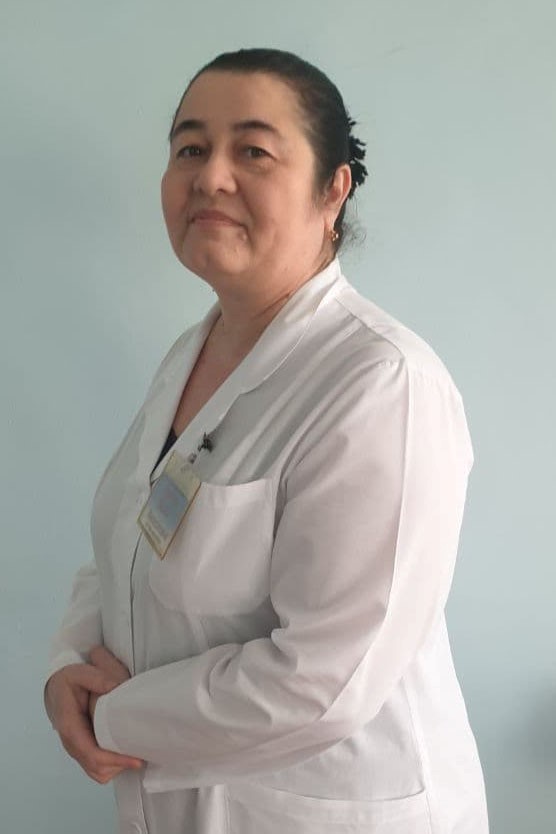
Усмонова Васила Мирвоситовна
- врач-лаборант высшей категории.
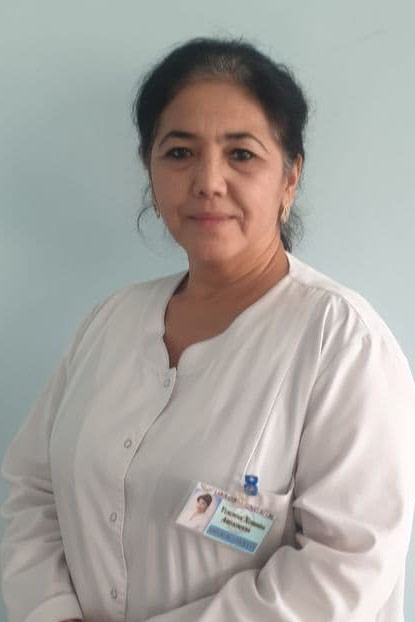
Юсупова Хуршида Арипжановна
- врач-лаборант высшей категории.
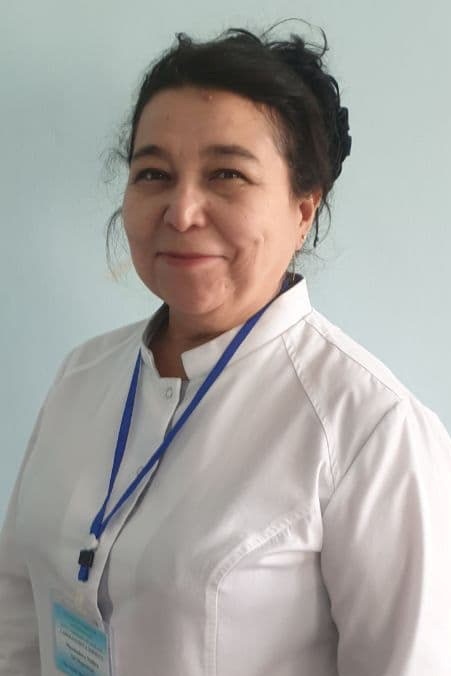
Махмудова Нодира Кучкоровна
- врач-лаборант высшей категории.